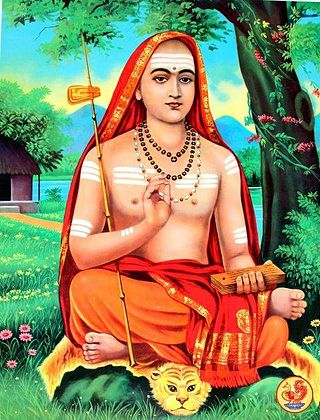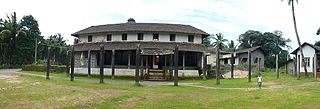South Canara was a district of the Madras Presidency of British India, located at 13.00°N 75.40°E. It comprised the towns of Kassergode and Udipi and adjacent villages, with the administration at Mangalore city. South Canara was one of the most heterogeneous areas of Madras Presidency, with Tulu, Malayalam, Kannada, Konkani, Marathi, Urdu, and Beary languages being spoken. It was succeeded by the Tulu-speaking areas of Dakshina Kannada district, the Malayalam-speaking area of Kasaragod district and the Amindivi islands sub-division of the Laccadives, in the year 1956.
Kalady or Kaladi is a town located between Angamaly and Perumbavoor, east of the Periyar river, near to Malayattoor in Ernakulam district of Kerala, India, not far from Cochin International Airport. It is notable as the birthplace of 9th century Indian philosopher Adi Shankara.
Saraswat Brahmins are spread over widely separated regions spanning from Kashmir and Punjab in North India to Konkan in West India to Kanara and Kerala in South India. In places such as western and southern India, the claim of Brahminhood of some communities who claim to be Saraswat Brahmins is disputed. The word Saraswat is derived from the Rigvedic Sarasvati River.
Kota Brahmins are a Hindu Brahmin subcaste mainly from the Indian state of Karnataka. Kota Brahmins take their name from their native village Kota. They speak a Kannada dialect different from the other regional dialects. Kota Brahmins are mainly concentrated in the villages of Kota of Udupi district. Kotas follow Smarta tradition. The Guru Narasimha Temple, Saligrama is important to them.

Tigalari or Tulu script is a Southern Brahmic script which was used to write Tulu, Kannada, and Sanskrit languages. It was primarily used for writing Vedic texts in Sanskrit. It evolved from the Grantha script.
Halenadu Karnataka Brahmins (HKBs) are a sect of Kannada speaking Smartha Brahmins and follow Advaita Vedanta propounded by Adi Shankaracharya. HKBs are essentially Rig Vedic Brahmins and are known to follow Dharmaśāstra extensively in their life.
Shenoy is a surname from coastal Karnataka and Goa in India. It is found among Hindus of the Goud Saraswat Brahmin community following Smartha Sampradaya of Kavale Matha or Madhva Sampradaya of either Gokarna Matha or Kashi Matha.
Devadiga also known as Moily, Sherigar is a Hindu Community or Caste. Devadigas were traditionally temple servants and musicians in Hindu temples. Devadigas are originally from the land stretching between Karwar in Uttara Kannada district of Karnataka and Kasaragod district of Kerala and some parts of Maharashtra in west-coast of India up to the Chandragiri River and Many People live in Shivamogga and Chikmagalur too. It is believed that their two divisions, namely Kannada Devadiga (Moily) and Tulu Devadiga (Moily); were endogamous in the past.
Sthānika Brāhmins belong to Hindu Tuluva Smartha Brahmin group.

Karkala is a town and the headquarters of eponymous Karkala taluk in the Udupi district of Karnataka state in India. It lies near the foothills of the Western Ghats, Karkala has a number of natural and historical landmarks, and is a major tourist and transit destination due to its strategic location along the way to Hebri, Sringeri, Kalasa, Horanadu, Udupi, Kollur, Subrahmanya and Dharmasthala.

Tulu Nadu State movement is aimed at increasing Tulu Nadu's influence and political power through the formation of separate Tulu Nadu state from Karnataka and Kerala. Tulu Nadu is a region on the south-western coast of India. It consists of the Dakshina Kannada and Udupi districts of Karnataka and Kasargod district up to the Chandragiri river in Kerala. The Chandragiri River has traditionally been considered a boundary between Tulu Nadu and Kerala from the fourth century AD onwards. The first call for a separate Tulu Nadu state was made just after the Quit India Movement in 1942 by Srinivas Updhyaya Paniyadi, a banker and a press owner from Udupi. Mangalore is the largest and the chief city of Tulu Nadu. Tulu activists have been demanding a separate Tulu Nadu state since the late 2000s, considering language and culture as the basis for their demand.

Balakudru Shrimatha is the Gurupeetha for the brahmins of South Canara District mainly Shivalli sects who follow Advaitha philosophy. The ashram is headed now by Shri Shri Narasimha Ashrama Swamiji, who also selected his successor-designate Shri Vasudeva Sadashiva Ashrama Swamiji on 22nd Nov 2024 in Bengaluru in the traditional manner.

Canarese Konkani are a set of dialects spoken by minority Konkani people of the Canara sub-region of Karnataka, and also in Kassergode of Kerala that was part of South Canara.
Konkani is a southern Indo-Aryan language belonging to the Indo-European family of languages spoken in the Konkan coastal region of India. It has approximately 3.6 million speakers.
Tulu Gowda and Arebhashe Gowda (Gauda) are primarily found in South Canara District, Kodagu District, Indian state of Karnataka and Bandadka village of Kasaragod. They are officially considered a subsect of the Vokkaliga community but are culturally and linguistically different. They speak Tulu and Arebhashe.

The Panchagrama Brahmins are a Brahmin community that follow the Smartha Sampradaya. They belong to the Indian state of Karnataka, and reside primarily in the districts of Udupi, Shimoga and Chikmaglur, Bengaluru and other cities.
Charodi Mesta community from Karnataka state in India. They known as Konkan Achar/Acharya or Charodi in North Canara & Malenadu Karnataka, Also known as Chari in Goa, and Nayak/Mesta/Mestha in North/South Canara, Karnataka. Their traditional work is carpentry..

Kannada Brahmins or Carnatic Brahmins are Kannada-speaking Brahmins, primarily living in Karnataka, and also present in the states of Telangana, Andhra Pradesh, Kerala, and Tamil Nadu. They belong to one of three traditions: Smartism, Sadh Vaishnavism, and Sri Vaishnavism, and are followers of Adi Shankara, Madhvacharya, and Ramanuja, respectively.






